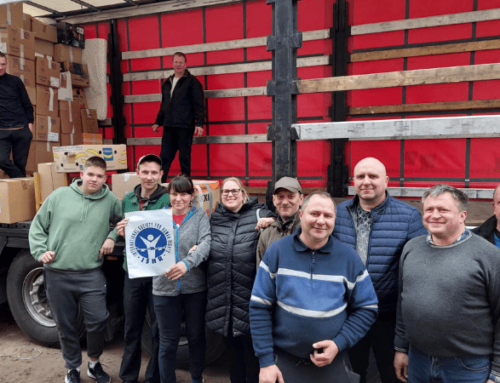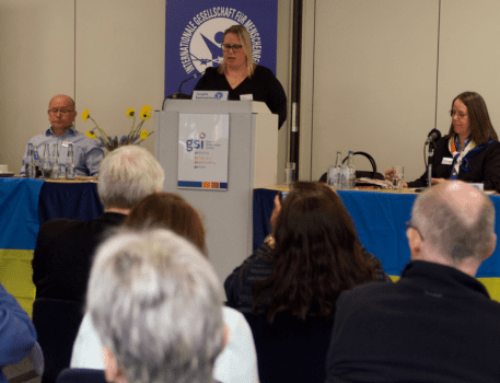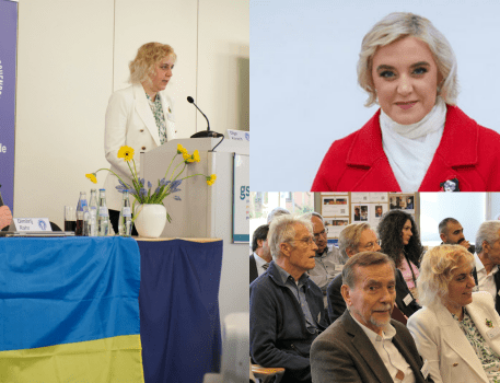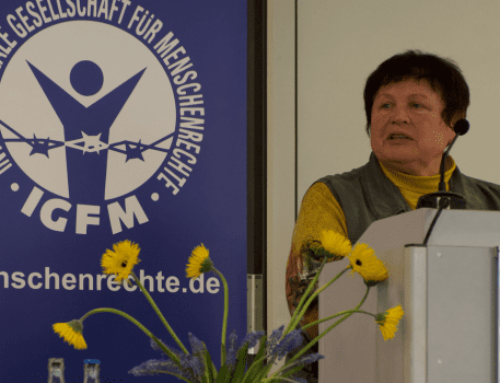Ukraine
The country of origin of the world’s most beautiful melodies has played itself out
A report by Dr. phil. C. Krusch-Grün,
International Society for Human Rights
August 2018
Deep frustration after 30 years of Ukrainian independence and untold suffering – the biggest country in Europe, the granary, the country with the most beautiful melodies is on its last legs
Small talk with a Ukrainian psychologist on the plane to Kiev
After a colleague was not able to travel at the last minute, I find myself unexpectedly sitting in a plane on the way to Kiev.
Beside me is a friendly elderly gentleman from the suburbs of Kiev. He has been in Switzerland and in Germany for the past month. His two children work there as psychologists.
I ask him how things are now, with Poroshenko as president and with the new government after the events of the Maidan. ‘Oh dear,’ he says, ‘everything is much worse than before’. People are worse off, unemployment is rising, and many are dependent on trying to earn money abroad to feed their families. The elderly stay behind with their measly pensions. I ask him delicately how high his pension is. Almost a little embarrassed, he admits that his pension is still relatively good, but he also worked for 50 years in a leading position as a psychologist in a hospital in Kiev. Converted, he receives 200€. He lovingly talks about his two children and his grandchildren; he is very happy that they were able to establish themselves abroad and he was in contact with them every day via Skype; Switzerland had fascinated him so much, and it was even more beautiful there than in Germany. I ask him, considering how bad the situation in his home country is, if he hadn’t considered spending his twilight years there, with his beloved children and grandchildren. Yes, he had already thought about it, but neither he nor his wife speak German; they live in the countryside in Ukraine and have a good and trustworthy community there. They have their friends, their garden, and their lives there. In that sense, no, they do not want to leave their homeland in their old age.
I ask him what he thinks of the new language laws in Ukraine, which are now supposed to make Ukrainian compulsory and forcefully suppress Russian. He answers as a child of a Ukrainian mother and a Russian father (as was Mikhail Gorbachev) and certainly also as a psychologist. For him, human beings are always in the foreground; this imposed hatred of Russians is not natural, one must always distinguish between the government and its people. He has always had a close bond with the Russian people, why should he hate them now? Yes, Putin is an autocrat, Poroshenko is a fraud, and overall, the world is teeming with bad presidents at the moment; this Trump is also crazy.
We continue talking until the landing in Kiev, no longer about politics, but about private matters, although we just met by chance. I received some caring psychological counselling during the journey and the farewell is heartfelt.

Personal encounters of our ÖPR 8 country team, an important moment in human rights work
I am relieved to see from in the plane that the predicted “schara” (heat) with rain, does not seem to be as mercilessly unrelenting as in the last (and coming) weeks in Germany. We will be picked up and taken to Hydropark Island in the middle of Kiev to an artistically furnished boat hotel; in this weather, it is a wonderful place for a workshop, in which we will meet with bloggers from all of the countries of the Eastern Partnership (EaP) and Russia to work on our co-developed transnational human rights website. This project is supported by the German Foreign Office, for which we are all very grateful. Within the EaP region (+Russia), there is a lot of interest in the developments happening in their ‘neighborhood’.
The eight country team has known each other for many years, and it is always nice to see how well everyone get along – the Russian representatives with those from Ukraine and Georgia, and even the representatives from Azerbaijan and Armenia.
The biggest revolution in the smallest country: A surprise gift for the 70th anniversary of the Universal Declaration of Human Rights
The Armenian representative is also the heroine in the opening round of greetings. It radiates over all over her face, bursting with happiness. All sincerely congratulate her and hug her warmly. She reports that she knows Nikol Pashinyan personally from their university days and the great hope that the entire country is now placing in him. They have managed a velvet revolution from below. But they also know that this is just the beginning, and that their president now desperately needs any support he can get. A lot has already happened since his election took place almost three months ago. Every day, corruption scandals are exposed and brought to the public’s attention, and criminal proceedings are initiated with concern for the observance of the rule of law. Every day there are demonstrations taking place; for example, students started to demonstrate for a new university director, and citizens resisted the construction of a road. It almost sounds like grassroots democracy. What I find very impressive is how Pashinyan managed to skillfully take the wind out of the sails of ‘hostile’ neighboring countries; To Turkey, he says that the international recognition of genocide is not a question of Armenian-Turkish relations. To Azerbaijan, he proposed a peaceful solution to the Nagorno-Karabakh conflict with the involvement of the OSCE. And during the second day of our workshop, he issued the arrest of former President Kocharyan on charges of election fraud and issuing the order to shoot at demonstrators with ensuing fatalities.
Economically, he has modern and skilled advisers who are aware that overcoming corruption and bribing, i.e. the “kleptocracy”, which is the term used in the famous book “Why Nations Fail” (the co-author of which serves as an advisor to Pashinyan), is of primary importance. This is what the  President and his team hopes to achieve, in addition to attracting financial support from the more than twice as many Armenians in the worldwide diaspora than the 3 million who currently inhabit the small and economically weak country.
President and his team hopes to achieve, in addition to attracting financial support from the more than twice as many Armenians in the worldwide diaspora than the 3 million who currently inhabit the small and economically weak country.
Aside from all of the doubts about the success of “fast” revolutions, I am happy to be infected by the joy, because, unfortunately, there are only too few occasions in human rights work to rejoice; in recent years, it seems that human rights violations are coming from countries which were previously thought to have been raised on the Universal Declaration of Human Rights as if it were breast milk. In light of the 70th anniversary of the Universal Declaration of Human Rights this year, it comes as a bitter gift.
World Cup in Russia: Strict separation of sport and conflict?
During the initial round of greetings, there were also many sports fans who asked the representative from Russia about his experienced during the World Cup in Moscow. Being from Moscow, he expressed how impressive it was to see and experience these crowds from all over the world on the streets of Moscow firsthand. It was something very special for everyone in Russia; almost gratefully, they took the opportunity to show these guests that they are not a cold, wicked people, and according to his perspective, this went well during the World Cup. You have to separate politics and international sports competitions. Even provocations like those of Shakiri or Vida would have no place on the field. “And what happened there in Germany with your Özil?”, was a question that suddenly caught everyone’s interest. I reported that he had been photographed with the Turkish president and therefore received strong criticism. I see that no one understands what exactly I mean by that and then comes the immediate follow-up question: “What is the problem with him being photographed with the Turkish president? He is from Turkey, right?” Slightly agitated, I explain that a player on the German national team also is also obligated to represent Germany, and that if he allowed himself to photographed before the presidential election and present Erdogan with his jersey as a gift, Özil was virtually displaying his support as a representative of Germany for Erdogan’s election campaign.
I reminded everyone that almost all of us sat together with Can Dundar last year; we know how many people Erdogan has put behind bars. Yes, everyone nods, but it is more out of amusement for my level of agitation, than from a place of understanding what I mean. And again, a follow-up question: “So you are saying, his right to freedom of opinion does not apply to him?” I try to explain further that football is very important to us; there is a football club in every small town and in every city, and for us, national players are also to some degree regarded as honorary dignitaries of our state. Still, all of the faces around me remain disbelieving. Almost angered, I say: “A German national footballer who grew up in our liberal democracy does not have to pose in public with a dictator who throws tens of thousands of innocent citizens into prison!” I’m still not sure they’ve understood me at this point, but I’m also not sure if I said the right thing; at least now they clearly understood why the topic of Özil took up so much space in our media. There are no questioning looks left, just small smiles of suppressed amusement.
A strict separation of sport and conflict may apply to the game on the field, but outside of that, in my opinion, world attention should be used as a respectful venue for addressing existing conflicts.
Just a fake? New Ukrainian geography textbook: Creating an identity under time pressure
Our representative from Moldova came across a new Ukrainian geography textbook for the eighth grade, allegedly recommended by the Ministry of Education by law. I sit nearby and listen as he reads from it out loud:
The country with the most beautiful melodies
Ukraine has existed for thousands of years within the same borders; as a country, it has the highest number and most melodic folk songs, on which all music in the world is based. The ethnic Ukrainian is full of fighting spirit, a heroic soldier, who protected the Western world then and now; Ukrainian women are renowned for their beauty. German scientists have identified Ukrainians as Germanic Slavs and American scientists have confirmed that the Ukrainian people belong to the oldest ethnicity in the world. The irresistible longing for the stars is a Ukrainian character trait, which is also the reason why Ukrainians have influenced space travel more than all other countries on earth combined. Moreover, Ukrainian wheat feeds every country in the world. Therefore, it can be said that the Ukrainian nation gave music, bread, and wings to the rest of the world.
There is laughter all around, and even I catch myself laughing. We all conclude that this must be a ‘fake’ created by the Russian side of things. Of course, Ukraine has a huge demand to form its own identity on the basis of a strict separation between itself all things Russian, but surely there must be better things to present than the country with the most melodious folk songs and the like.
Migration in Europe: A Ukrainian theory for young middle school students
While the phrases above are ridiculous to the point of being amusing, the book also includes some paragraphs that I would consider anything but funny:
“Until recently, European countries were dominated by the theory and practices of multiculturalism. European politicians thought that immigrants would gradually embrace the culture and traditions of the countries they immigrated to, learn their languages, and become Germans, Frenchmen, Italians and so on. However, this did not happen. Representatives of national minorities preferred an isolated existence to preserve their native traditions, languages, religions etc. And today, we can see that this trend spreading throughout the world. National minorities have settled down in their own areas and neighborhoods, in which they prefer not to allow strangers to enter. This has led to some national minorities forming strange mini-states within European countries. They do not only behave neutrally towards the traditional states, but also hostilely.”
Deep frustration after 30 years of Ukrainian independence and untold suffering – the biggest country in Europe, the granary, the country with the most beautiful melodies is on its last legs
Boris, my old Ukrainian colleague, who joined the welcome meeting, is convinced that this textbook is no joke and not a Russian fake. For him, his home had become an absolute “madhouse”.
is no joke and not a Russian fake. For him, his home had become an absolute “madhouse”.
Boris, a courageous human rights activist from the old Soviet era and a former employee of the newly formed Parliament after formation of the state of Ukraine in 1991. I remember how proud and enthusiastic everyone was then. I understand his anger and disappointment. Almost thirty years have passed and where did this enthusiastic pioneering spirit land them? For years, there has been war dragging on in eastern Ukraine, creating 2 million refugees, more than ten thousand dead and even more wounded; the Ukrainian civilians living in the war zones barely survive under conditions of extreme duress, with bullets continuing to fly every day, resulting in “unspeakable suffering,” in the words of an OSCE leader. The largest country in Europe, the granary, the country with the most beautiful melodies, is not able to play loudly enough to be heard over the cacophony of drums and trumpets of the current turmoil in the world. The oligarchs enjoy the chocolatey side of power and share nothing with the people; nationalist simplifications are created to point of absurdity; hooliganism, arbitrariness, and inhumane conditions of detention continue to worsen. At least that’s how my old friend feels.

On the right path towards Europe
However Boris’s perspective is not only one; in fact, his view is the opposite of another Ukrainian friend of mine, who I visited in Odessa last year. From his viewpoint, Ukraine is on the only right path following the events of the Maidan, by finally committing to go in the direction of Europe. This path is the one to freedom and independence and steers decidedly away from the eternal throne of Putin and from the Soviet model. If Poroshenko is a bad president, he will simply not be re-elected, and a new one will follow; if he is just as bad (or she, as the current leading candidate appears to be Yulia Tymoshenko) will be voted out again. At some point a good one will come; the overall direction is of more importance.
Hooligans in Kiev, nothing out of the ordinary
My friend also told me, that after being used as “front-line fighters” during the Maidan, the right-wing nationalist parties dissolved, more or less into nothing. De facto, however, there are still a large number of remnants, including violent nationalist hardliners who beat conscientious objectors such as Ruslan Kotsaba, wreck courtrooms, or commit attacks against Sinti and Roma, often with impunity. Even the usual violent criminal groups seem to have lost respect for the law.
At breakfast the next morning, I learn that some members of the group had gone to a karaoke bar late in the evening, where suddenly a group of ten masked men showed up and destroyed the whole place within a very short time and then disappeared again. All of the guests remained sitting, silent and stalk still; later, the police arrived and everything was as if nothing had happened. The other guests at the karaoke bar said to them that this was nothing unusual. I am shocked and call the Ukrainian colleagues to report the details of the story. Yes, unfortunately that was nothing unusual, something like that could happen even in broad daylight. We hold another group session in which we inform all participants and ask them to avoid potentially shady situations.
A come-back for Tymoshenko on March 31, 2019: Not an April Fool’s joke?
After that, we get to work. Our transnational website, which was developed jointly two years ago, is a very delicate and dynamic product that is constantly subject to new technical innovations and  adjustments. We put in hard work and focused effort all weekend; thankfully, it was not as hot as in Kiev back home and our conference room was located on the Dnieper River. There is still time to discuss sensitive topics that we are not able to publish on our website this weekend, but time flies and the farewells in this special group is always a bit painful.
adjustments. We put in hard work and focused effort all weekend; thankfully, it was not as hot as in Kiev back home and our conference room was located on the Dnieper River. There is still time to discuss sensitive topics that we are not able to publish on our website this weekend, but time flies and the farewells in this special group is always a bit painful.
And just like that I am sitting in the taxi back to Kiev’s Borispol Airport. The taxi driver asks if I have correct change, as he does not have any change. The price of 189 hryvnia had been agreed upon with his taxi company in advance. That’s about 6€ for 35 km. At a gasoline price of 95 cents per liter, his company earns just under 3€. I do not know how much of this amount the driver receives. I give him 210 hryvnia, and he is pleased about a tip of 70 cents. Although I have a guilty conscience, I enjoy the luxury of the taxi ride, knowing that in Frankfurt I will have to plunge into the throng of public transport again.
I ask him how things are now that Poroshenko is president and with the new government after the Maidan. “Oh dear,” he says, “everything is much worse than before”. “People are worse off, unemployment is rising, and many are dependent on trying to earn money from abroad to feed their families. The elderly stay behind with their measly pensions”. I do not ask him about his future pension. I said, it seems that Tymoshenko will be running in next year’s elections. Yes, he says, she is the last hope, as someone who can assert herself among those at the top; not like Poroshenko, he is too weak. She would end the war and make living conditions better for the people in Ukraine.
I am stunned that Tymoshenko, who wanted to “shoot the Russian dogs and their leader herself” four years ago, is now perceived as a peace-maker. That she, as an oligarch with numerous entanglements in corruption long before she was Prime Minister, is now seen as the bearer of hope against the social hardship of the population.
The fact that Poroshenko will not be re-elected has been clear for a long time; four years ago, the ISHR had already advised against a hasty election with him as virtually the only candidate. However, the fact that Tymoshenko is back at the forefront is a bit surprising. Apparently, her complete turnaround away from warmongering towards more conciliatory tones and the promise of addressing the social problems of the population, has perfectly hit the ‘Where does it hurt?’ spot.
Even as a woman, she has proven through her unusual history that she does not let anyone of ‘those up there’ get the better of her. Of fourteen presidential candidates, not even the most famous rock singer or actor in Ukraine can compete with that.
“Those up there” – “Oni nam ne dadut” – They will never allow us that
Although I actually know the answer, I asked one last question: “Is there no one sensible from a party that the people can trust, who comes from the base with a solid program?” “Ah, how can you ask such a question; “oni sche nam ne dadut”, literally: They (‘those up there’) would never allow us that, was his immediate response.
I feel sick to my stomach again; 27 years after independence, 4 years after the Maidan and this is still the answer.
P.S. Not a fake
Back in Frankfurt, I received an e-mail on the following day, with the link to the regulation of the Ministry as well as a link to the Ukrainian Geography textbook.









Leave A Comment